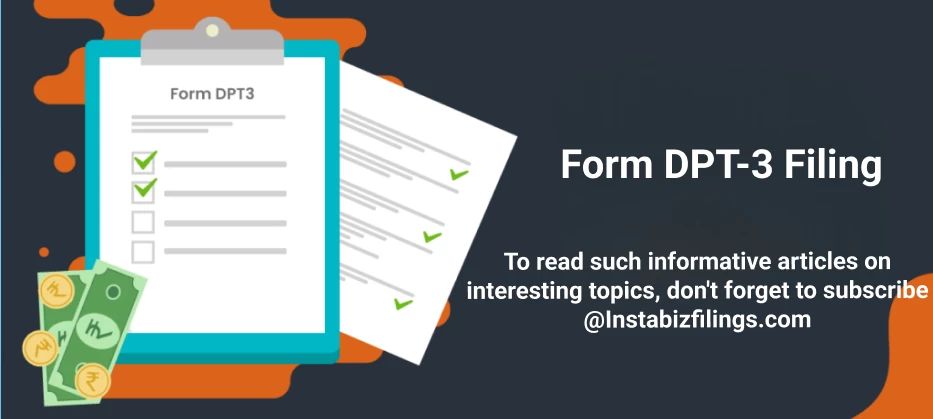
Form DPT-3 Filing
June 4, 2025 by Team Instabizfilings
What is Form DPT-3?
All companies registered in India covered by the Companies (Acceptance of Deposits) Rules, 2014, are required to file a DPT-3 return with the Ministry of Corporate Affairs. All companies are required to complete this form to show any outstanding loans, advances or non-deposit transactions that they have received.
By way of this form, the government reviews how companies manage their finances and guarantees they do not break the rules on accepting deposits.
Who Needs to File Form DPT-3?
All companies except:
-
Government companies
-
Banking companies
-
Non-Banking Financial Companies (NBFCs)
-
Housing Finance Companies
Required to file:
-
One Person Companies (OPCs)
-
Small Companies
Even if the company has not accepted any deposits, it must file DPT-3 to report nil returns if it has other types of outstanding amounts considered as non-deposit under the Rules.
Types of Disclosures in DPT-3
-
One-time Return: Reporting payment that has not been treated as a deposit as of 31st March of the current financial year.
-
Annual Return: Every year on 31st March, you must disclose both your deposits and non-deposit transactions (such as loans and advances).
Due Date for DPT-3 Filing
In the following year, DPT-3 should be submitted on 30th June for every financial year.
For example:
-
The deadline for FY 2024–25 is 30th June 2025.
If you are not on time in filing, you could receive penalties.
Documents Required for Filing DPT-3
Form DPT-3 is filed by companies after preparing these necessary documents.
-
Auditor’s Certificate
-
Outstanding debt owed
-
Passing Board Resolution to allow the filing
-
If required, the trust deed should be copied.
-
Copy of the instrument used to create the charges (if such an instrument exists)
Key Information to be Filled in DPT-3
-
Company details (CIN, name, email, etc.)
-
Whether the form is for the return of deposit, return of non-deposit or both
-
Net worth of the company
-
Details of outstanding amounts with classification (secured/unsecured, nature of borrowing)
-
Auditor’s certificate and attachments
Penalties for Non-Filing
Skipping DPT-3 documentation can cause:
-
Company: If a company defaults, the maximum amount they may have to pay is ₹5,000, with an extra ₹500 each day until the debt is paid.
-
Officers in default: An officer who is caught in default could face up to 7 years in prison and/or a fine of up to 25 lakhs.
How to File Form DPT-3: Step-by-Step Process
-
Login to MCA portal.
-
Download e-form DPT-3 from the MCA website.
-
Fill in company details and required disclosures.
-
Attach the necessary documents.
-
Both the director and a Calcutta High Court chartered professional (CA/CS/CMA) should digitally sign the form.
-
Upload the form on the MCA portal.
-
Pay the applicable fee online and note the SRN (Service Request Number).
Common Mistakes to Avoid
-
Paying your taxes late
-
Loans or deposits being grouped with the wrong account
-
When there is no Auditor’s Certificate or it isn’t recognized
-
A difference between the disclosed figures and the accounting records
Conclusion
Filing Form DPT-3 is legally necessary for all Indian companies. Making sure that information is given to shareholders on time and properly helps the company stay legal and also increases their financial cleariness. For any business, management of finances and lodging the DPT-3 before 30th June is required every year.
If you’d like help with Form DPT-3, consult a Company Secretary (CS) or Chartered Accountant (CA) to avoid mistakes.
Disclaimer
The information provided in this blog is purely for general informational purposes only. While every effort has been made to ensure the accuracy, reliability and completeness of the content presented, we make no representations or warranties of any kind, express or implied, for the same.
We expressly disclaim any and all liability for any loss, damage or injury arising from or in connection with the use of or reliance on this information. This includes, but is not limited to, any direct, indirect, incidental, consequential or punitive damage.
Further, we reserve the right to make changes to the content at any time without prior notice. For specific advice tailored to your situation, we request you to get in touch with us.

Need more details? We can help! Talk to our experts now!
Start Your Business Registration – Talk to Our Experts Now!

Still Confused?
Talk to experts? Fill in the information and we will reach out in 24 Working Hours.

